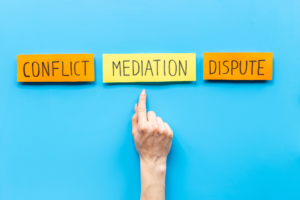Mediation is a process built on trust, impartiality, and the belief that a neutral mediator will guide parties toward resolution without mediator bias. However, there are instances when a mediator may unintentionally or intentionally stray from neutrality, leaving participants feeling frustrated or unheard. In this article, we'll explore signs that your mediator may not be …
Mediation is a process built on trust, impartiality, and the belief that a neutral mediator will guide parties toward resolution without mediator bias.
However, there are instances when a mediator may unintentionally or intentionally stray from neutrality, leaving participants feeling frustrated or unheard. In this article, we’ll explore signs that your mediator may not be neutral and discuss what steps you can take to address the situation while remaining committed to the mediation process.

Recognizing Signs of Mediator Bias
Before taking action, it’s crucial to recognize potential signs of mediator bias. While mediators should always strive for neutrality, these signs may indicate that they are not meeting that standard:
Case 1: The Biased Mediator
Jenny and Mark, a divorcing couple, began their mediation sessions with optimism, hoping to reach a fair settlement. However, they soon noticed that their mediator, Sarah, seemed to side with Mark during discussions about asset division consistently. Sarah would validate Mark’s suggestions and subtly discourage Jenny’s input.
Jenny felt unheard and started keeping score – she tracked the number of times Sarah disregarded what she said and focused on Mark’s opinions or wants. Jenny addressed the issue directly with Sarah in a separate phone conversation, recognizing the signs of mediator bias. She shared her opinion in an individual discussion with Sarah, stating what she was experiencing and asking that Sarah take special care to ensure equal sharing of their views. Then, Jenny asked her to provide comparable treatment and respect for each of them, reminding Sarah that they chose mediation, assuming that their points of view would be honored equally.
After giving the case more thought, Sarah apologized to Jenny after realizing she had been favoring Mark’s opinion. Her apology was not because she gave it more weight; it was that she felt herself identifying with Jenny’s situation and overcompensating in her support of Mark to balance her perceived bias toward his spouse.
Case 2: The Mediator Who Offers Advice
David and Lisa, another couple going through mediation, were repeatedly frustrated when their mediator, Michael, offered unsolicited advice. Instead of guiding the conversation and facilitating discussion, Michael suggested specific solutions for their property division and child custody issues. Michael seemed rushed. Often, it appeared to Lisa and David that he’d come to a conclusion well before they even talked about things and just wanted them to agree with him.
Knowing that the mediator’s role is not to provide solutions, David and Lisa sought clarification from Michael about his role in the mediation process. They reminded him that they wanted him to remain neutral and focus on facilitating their dialogue rather than making decisions for them.
After this discussion with their mediator, they stayed for one more session, and nothing changed. They decided they needed to seek someone to let them work through the issues they were facing and help them make their own decisions. Lisa and David sought another mediator.

Taking Action When Neutrality Is Lacking
When you suspect that your mediator is not being neutral, consider these steps to address the situation while staying committed to the mediation process:
Case 3: Requesting a Co-Mediator
Sometimes, the bias may persist despite your efforts to address it with the mediator. Sarah and John, who had ongoing concerns about their mediator, Jacob, experienced this. Jacob’s apparent favoritism was negatively impacting the mediation sessions.
Sarah and John had already invested multiple sessions in the mediation and, while they felt they’d reached a standstill with Jacob, didn’t want to start again. They decided to request a co-mediator to ensure a fair process. With the assistance of a neutral co-mediator, they could resume productive discussions and eventually reached a settlement that both parties found equitable.
Case 4: Consulting with Legal Counsel to Avoid Mediator Bias
In rare instances, the mediator’s bias may be so pronounced that it jeopardizes the integrity of the mediation process. In such cases, consulting with legal counsel may become necessary.
Karen took the path of finding additional professional support. She suspected that her mediator was steering the mediation in favor of her ex-spouse. Concerned about her rights, she consulted with an attorney experienced in mediation. With the consent of her spouse, they incorporated her lawyer into the mediation without abandoning the process altogether. This strategy protected Karen’s interests while continuing to engage in the mediation process. She had an advocate in the proceedings, and she and her soon-to-be ex-husband continued to manage their divorce and keep their divorce out of court and both their expenses and timeline manageable.

The Commitment to a Fair Resolution without Mediator Bias
While facing a mediator who lacks neutrality can be challenging, it’s essential to remember your commitment to achieving a fair and mutually agreeable resolution.
Mediation is a valuable process when conducted with integrity, and taking the proper steps can help ensure that you receive the impartial and unbiased guidance you deserve.
The goal is not to abandon mediation but to preserve the principles of fairness, open communication, and respect that make mediation an effective and transformative approach to conflict resolution. By addressing issues of mediator bias head-on, you can work towards a solution that reflects the best interests of all parties involved.
Here at Bridging Divorce Solutions, we strive to remain neutral during this emotional time. Reach out to see how we can ensure your divorce is as painless as possible so you can get back to building your new life after divorce.


Brenda Bridges
Mediator, MAT, RICP®, CDFA®, CDC®








